The Intel Kaby Lake-X i7 7740X and i5 7640X Review: The New Single-Threaded Champion, OC to 5GHz
by Ian Cutress on July 24, 2017 8:30 AM EST- Posted in
- CPUs
- Intel
- Kaby Lake
- X299
- Basin Falls
- Kaby Lake-X
- i7-7740X
- i5-7640X
Benchmarking Performance: CPU Legacy Tests
Our legacy tests represent benchmarks that were once at the height of their time. Some of these are industry standard synthetics, and we have data going back over 10 years. All of the data here has been rerun on Windows 10, and we plan to go back several generations of components to see how performance has evolved.
All of our benchmark results can also be found in our benchmark engine, Bench.
3D Particle Movement v1
3DPM is a self-penned benchmark, taking basic 3D movement algorithms used in Brownian Motion simulations and testing them for speed. High floating point performance, MHz and IPC wins in the single thread version, whereas the multithread version has to handle the threads and loves more cores. This is the original version, written in the style of a typical non-computer science student coding up an algorithm for their theoretical problem, and comes without any non-obvious optimizations not already performed by the compiler, such as false sharing.
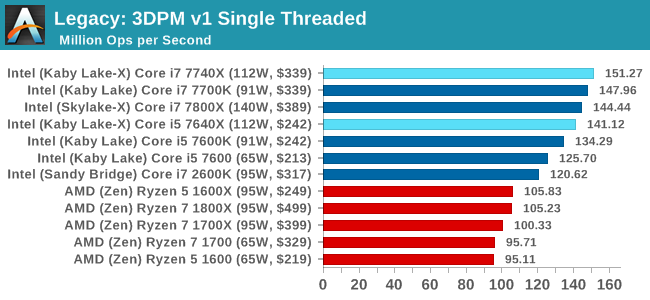
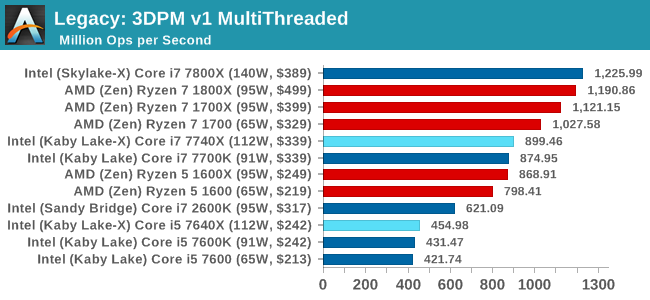
CineBench 11.5 and 10
Cinebench is a widely known benchmarking tool for measuring performance relative to MAXON's animation software Cinema 4D. Cinebench has been optimized over a decade and focuses on purely CPU horsepower, meaning if there is a discrepancy in pure throughput characteristics, Cinebench is likely to show that discrepancy. Arguably other software doesn't make use of all the tools available, so the real world relevance might purely be academic, but given our large database of data for Cinebench it seems difficult to ignore a small five-minute test. We run the modern version 15 in this test, as well as the older 11.5 and 10 due to our back data.
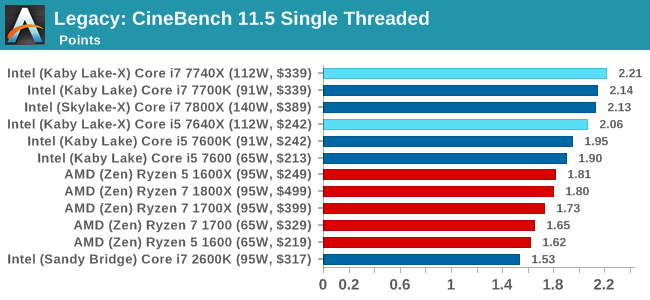
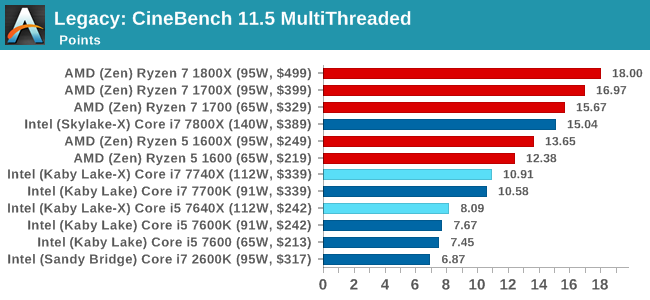
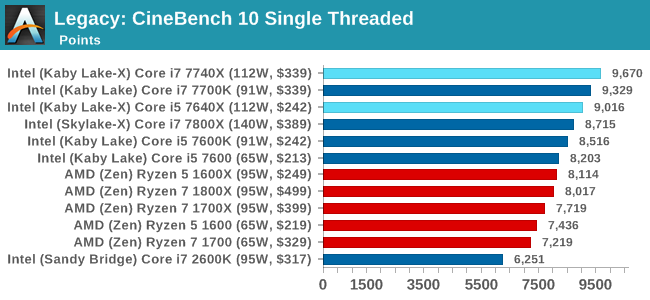

x264 HD 3.0
Similarly, the x264 HD 3.0 package we use here is also kept for historic regressional data. The latest version is 5.0.1, and encodes a 1080p video clip into a high-quality x264 file. Version 3.0 only performs the same test on a 720p file, and in most circumstances the software performance hits its limit on high-end processors, but still works well for mainstream and low-end. Also, this version only takes a few minutes, whereas the latest can take over 90 minutes to run.
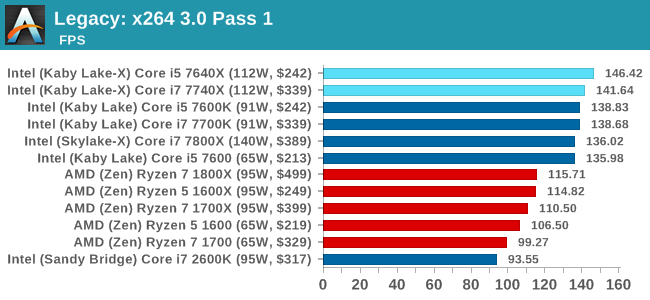
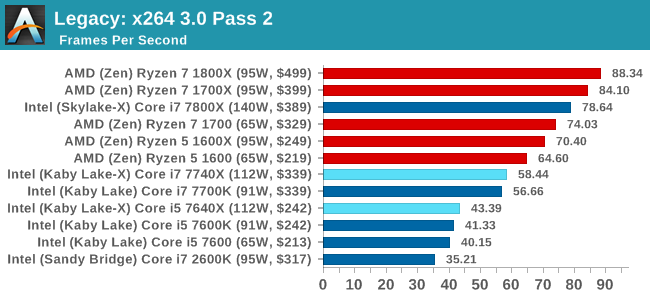










176 Comments
View All Comments
MrSpadge - Monday, July 24, 2017 - link
> realize that overclocking may not be appropriate for these workloadsThat's going too far. Just don't overclock as far for heavy AVX usage.
MrSpadge - Monday, July 24, 2017 - link
Kind of agreed. Ian, you should log the clock speeds during benchmark runs and check for anomalies. The chip or mainboard could throttle, or your 4.0 GHz AVX clock could just be way too low. What's the default AVX clock? Maybe 4.4 GHz? That would pretty much match the 10% performance degradation.Ian Cutress - Monday, July 24, 2017 - link
I need to do a performance scaling piece, I know. It's on the to-do listKvaern1 - Monday, July 24, 2017 - link
As already mentioned it's heavy AVX workloads which makes it throttle when OC'ed. The same thing happens on OC'ed Skylakes.arh2o - Monday, July 24, 2017 - link
Something seems wrong with the 7700k results vs the 7600k results. How is the 7600k beating the 7700k so handily in all the games? Are you sure the graphs are not swapped? ROTR shows the 7600k beating the 7700k by 20 FPS which seems impossible considering most reviews on this game have the 7700k on top of the 7600k.ydeer - Monday, July 24, 2017 - link
I would have liked to see some idle power consumption numbers because my PC is always on.Ro_Ja - Monday, July 24, 2017 - link
This was an interesting read. Thank you!Marnox - Monday, July 24, 2017 - link
According to Intel (https://ark.intel.com/products/97129/Intel-Core-i7... the Turbo speed for the 7700K is the same as the 7740X.mapesdhs - Monday, July 24, 2017 - link
Is the Max Turbo for one core or two? Always bugged me that Intel doesn't list the individual core/bin levels.versesuvius - Monday, July 24, 2017 - link
It will be interesting to see how many of these CPUs Intel will actually produce (collect ?) and bring to the market.